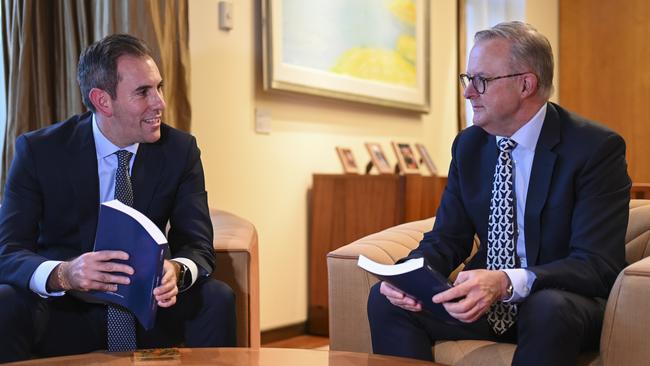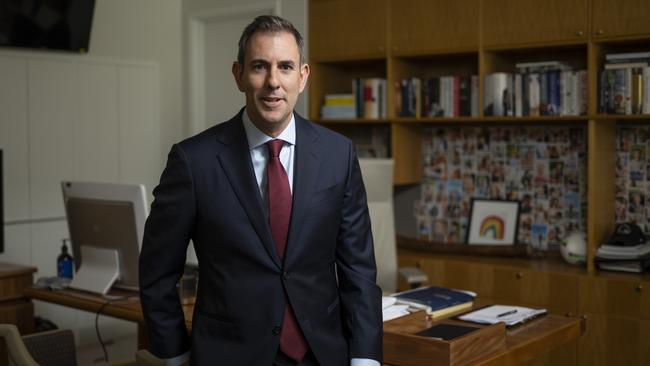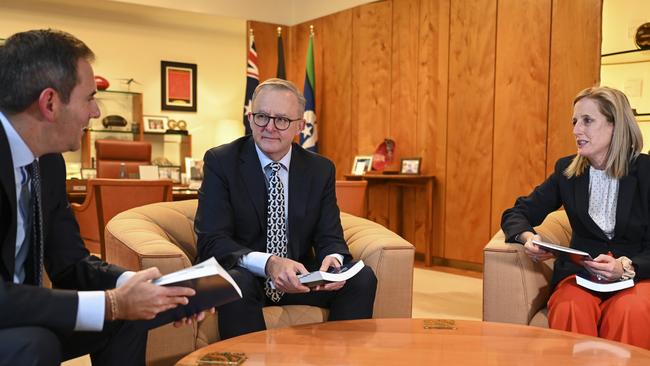Labor will deliver a modest $4 billion surplus after 15 years of budgets in the red
After floods, fires, a pandemic and a global recession, Australia will have a budget surplus for the first time in 15 years thanks to an “unprecedented” $143bn windfall.

National
Don't miss out on the headlines from National. Followed categories will be added to My News.
After floods, fires, a pandemic and a global recession Australia will have a budget surplus for the first time in 15 years amid an “unprecedented” $143 billion turnaround in the nation’s fortunes.
Treasurer Jim Chalmers will today reveal the federal government is on track to deliver a modest $4bn surplus — a more than $40bn improvement on October forecasts — for the 2022-23 financial year, with subsequent budgets to post far smaller deficits than previously predicted.
Over the four years to 2025-26 the budget bottom line will be $143bn better off than was forecast a year ago, meaning Australia’s combined deficits will be about $80bn.
In March last year the Coalition’s final budget estimated the total deficits for that same period would be a whopping $224.7bn.
But Labor has declared there will be no “back in black” celebratory mugs printed yet, with the surplus not official until the final receipts are counted after June 30.

About 40 per cent of the additional revenue flowing in to the budget this financial year has been attributed to high employment and a pick-up in wages growth, while about 20 per cent was due to higher commodity prices.
The remainder was due to greater revenue from other sources including higher non-mining company profits.
The government is returning 82 per cent of the unexpected revenue windfall back to the budget.
Mr Chalmers said the improvements in the budget were a “direct and deliberate result” of the government’s approach to return the majority of the “substantial near-term boosts” to revenue.
“Our responsible economic management is all about spending restraint, substantial savings redirected to other priorities, and modest but meaningful tax changes,” he said.
“What’s absolutely clear is that this outcome would never have been possible without our decision to return most of the upward revisions to revenue to the bottom line.”

Mr Chalmers said debt and deficits would be “bigger” and the inflation challenge “even more serious” if the government hadn’t changed from the approach taken by the Coalition.
“Despite the substantial progress we’ve made, it will take more than one budget or one term to clean up the mess we inherited,” he said.
“We are putting the Budget on a much more sustainable footing at the same time as we provide cost of living relief and invest in the future.”
Returning from the UK following the coronation of King Charles, Anthony Albanese told his colleagues at a caucus meeting on Monday the budget would be in the “best tradition” of the Labor Party.
“Dealing with those immediate challenges, but always with the eye on the future, on the medium and long-term, to make sure that we’re delivering, laying those foundations for a better future that we promised,” the Prime Minister said.
The budget will include $14.6bn in cost-of-living relief, including expanded single parent payments, a boost to Jobseeker, energy bill relief for 5.5 million households, cheaper childcare and medicines.
More Coverage
Originally published as Labor will deliver a modest $4 billion surplus after 15 years of budgets in the red





